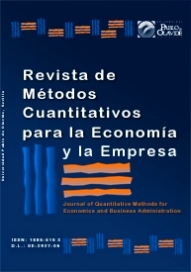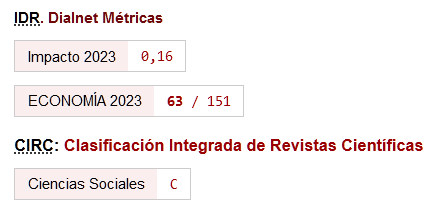Operational, Financial and Economic Efficiency of PEMEX: An Envelopment Analysis Data from 2011 to 2021
DOI:
https://doi.org/10.46661/rev.metodoscuant.econ.empresa.8773Keywords:
Mining, extraction and refining: hydrocarbon fuels, allocative efficiency, mathematical and simulation modelingAbstract
PEMEX's technical efficiency represents an essential aspect in understanding its ability to enhance oil profitability and, consequently, increase the quality of life of a large number of Mexicans. Despite the significant changes derived from the 2013 Energy Reform and the notable investment plan promoted by the current administration, PEMEX continues to face considerable challenges in efficiency and performance terms. To evaluate its technical efficiency in operational, financial, and economic aspects, we employed a linear programming model based on Data Envelopment Analysis (DEA). The results obtained demonstrate that PEMEX exhibits efficiency scores above the sample average in its operational and financial indicators. However, there is significant room for improvement in its economic performance metrics. Finally, we outline a set of possible solutions to address the corporate and tax governance issues of said company, with the aim of improving its technical efficiency.
Downloads
References
Al-Mana, A., Nawaz, W., Kamal, A., & Koç, M. (2020). Financial and operational efficiencies of national and international oil companies: an empirical investigation. Resources Policy, Elsevier, 68, 101701. https://doi.org/10.1016/j.resourpol.2020.101701
Atris, A. M., & Goto, M. (2019). Vertical structure and efficiency assessment of the US oil and gas companies. Resources Policy, 63, 101437. 1-13. https://doi.org/10.1016/j.resourpol.2019.101437
Banker, R. D., Charnes, A., & Cooper, W. (1984). Some models for estimating technical and scale inefficiencies in data envelopment analysis. Management Science, 30(9), 1078-1092.https://doi.org/10.1287/mnsc.30.9.1078
Cabrales, S., Bautista, R., & Benavides, J. (2017). A model to assess the impact of employment policy and subsidized domestic fuel prices on national oil companies. Energy Economics, 68, 566-578. https://doi.org/10.1016/j.eneco.2017.10.038
Cámara de Diputados del H. Congreso de la Unión. (2014). Ley de Petróleos Mexicanos. Disponible en:https://www.diputados.gob.mx/LeyesBiblio/pdf/LPM_110814.pdf
Cámara de Diputados del H. Congreso de la Unión. (2021). Ley de Ingresos de la Federación para el Ejercicio Fiscal de 2022 publicada en el Diario Oficial de la Federación (12 de diciembre de 2021). Disponible en: https://www.diputados.gob.mx/LeyesBiblio/pdf/LIF_2022.pdf
Charnes, A., Cooper, W., & Rhodes, E. L. (1978). Measuring efficiency of decision making units. European Journal of Operational Research, 2(6). 429-444. https://doi.org/10.1016/0377-2217(78)90138-8
Coelli, T., Prasado Rao, D., O' Donnell, C., & Battese, G. (2005). An Introduction to Efficiency and Productivity Analysis. New York: Springer.
Cook, W., & Seiford, L. (2008). Data Envelopment Analysis - Thirty year on. European Journal of Operational Research, 192(1). 1-17.https://doi.org/10.1016/j.ejor.2008.01.032
Cooper, W. W., Seiford, L., & Zhu, J. (2011). Handbook on Data Envelopment Analysis. New York: Springer.https://doi.org/10.1007/978-1-4419-6151-8
Eller, S., Hartley, P., & Medlock III, K. (2007). Empirical evidence on the operational efficiency of national oil companies. The Changing Role of National Oil Companies in International Energy Markets, 40, 2-36. Disponible en: http://large.stanford.edu/publications/power/references/baker/studies/noc/docs/NOC_Empirical.pdf
Farrell, M. J. (1957). The measurement of productive efficiency. Journal of Royal Statistical Society, 120(3), 253-281. https://doi.org/10.2307/2343100
Hartley, P., & Medlock III, K. (2008). A model of the operation and development of a National Oil Company. Energy Economics, 30(5), 2459-2485. https://doi.org/10.1016/j.eneco.2007.12.017
Hawdon, D. (2003). Efficiency, performance and regulation of the international gas industry-a bootstrap DEA approach. Energy Policy, 31(11), 1167-1178. https://doi.org/10.1016/S0301-4215(02)00218-5
Heller, P., Mahdavi, P., & Schreuder, J. (2014). Reforming National Oil Companies: Nine Recommendations. Natural Resource Governance Institute, 1-24. Disponible en: https://resourcegovernance.org/sites/default/files/documents/nrgi_9recs_eng_v3.pdf
Jara-Bertin, M., Musacchio, A., & Wagner, R. (2022). Leviathan as a financial godfather: Debt advantages of wholly state-owned enterprises. Global Strategy Journal. 14(2). 225-251. https://doi.org/10.1002/gsj.1457
Lim, C., & Lee, J. (2020). An analysis of the efficiency of the oil refining industry in the OECD countries. Energy Policy, 142, 111491.
https://doi.org/10.1016/j.enpol.2020.111491
Lu, L., Zhang, J., Yang, F., & Zhang, Y. (2020). Evaluation and prediction on total factor productivity of Chinese petroleum companies via three-stage DEA model and time series neural network model. Sustainable Computing: Informatics and Systems. 27(3), 100397.
https://doi.org/10.1016/j.suscom.2020.100397
Martínez-Hernández, F.A. & Herrera-Aguilar, S. (2021). Pemex, su reestructuración corporativa, financiera y productiva y los efectos de ésta sobre la balanza comercial petrolera. El Trimestre Económico, LXXXVIII 1-39, 143-180. https://doi.org/10.20430/ete.v88i349.1005
Musacchio, A., Pineda Ayerbe, E., & Garcia, G. (2015). State-Owned Enterprise Reform in Latin America. Issues and Possible Solutions. Inter-American Development Bank. Fiscal and Municipal Management Division, 2-48. https://doi.org/10.18235/0000128
Natural Resource Governance Institute. (Mayo de 2022). National Oil Company Database. Disponible en: https://www.nationaloilcompanydata.org/
Ohene-Asare, K., Turkson, C., & Afful-Dadzie, A. (2017). Multinational operation, ownership and efficiency differences in the international oil industry. Energy Economics, 303-312. https://doi.org/10.1016/j.eneco.2017.10.006
Petróleos Mexicanos. (2021). Plan de negocios de Petróleos Mexicanos y sus empresas productivas subsidiarias 2021-2025. Disponible en: https://www.pemex.com/acerca/plan-de-negocios/Documents/pn_2021-2025-completo.pdf
Petróleos Mexicanos. (2022). Plan de negocios de Petróleos Mexicanos y sus empresas productivas subsidiarias 2023-2027. Disponible en: https://www.pemex.com/acerca/plan-de-negocios/Documents/pn_2021-2025-completo.pdf
Ramírez-Cendrero, J., & Paz, M. (2017). Oil fiscal regimes and national oil companies: a comparison between Pemex and Petrobras. Energy Policy, 101, 473-483. https://doi.org/10.1016/j.enpol.2016.11.009
Silva Gutierrez, D., Bonilla, D., & Moreno Vite, A. (2021). Energy reform in Mexico and its impact on Pemex productivity. The Extractive Industries and Society.8(2), 200-230. https://doi.org/10.1016/j.exis.2021.02.006
Silva Gutierrez, D., Paz, M., & Moreno Vite, A. (2021). Factors that explain the results of the national oil companies: The impact of the fiscal role on Pemex's results. 74, 102280. 1-14. Resources Policy. https://doi.org/10.1016/j.resourpol.2021.102280
Thompson, R., & Dharmapala, P. (1996). DEA/AR efficiency and profitability of 14 major oil companies in U.S. exploration and production. Computers & Operations Research, 23(4), 357-373. https://doi.org/10.1016/0305-0548(95)00044-5
Toshiyuki, S. (2000). Stochastic DEA for restructure strategy: an application to a Japanese petroleum company. Omega, 28(4), 385-398. https://doi.org/10.1016/S0305-0483(99)00069-9
Wang, Q., Zhao, Z., Zhou, P., & Zhou, D. (2013). Energy efficiency and production technology heterogeneity in China: A meta-frontier DEA approach. Economic Modelling, 35(C), 283-289. https://doi.org/10.1016/j.econmod.2013.07.017
Wolf, C. (2009). Does ownership matter? The performance and efficiency of State Oil vs. Private Oil (1987-2006). Energy Policy, 37(7), 2642-2652. https://doi.org/10.1016/j.enpol.2009.02.041
Xun, A., Hanrui, B., & Xiaoyang, Z. (2011). A DEA approach to evaluate economic and social roles of NOCs. Energy Procedia, (5), 763-767. https://doi.org/10.1016/j.egypro.2011.03.134
Zha, Y., Song, A., Chuanyong, X., & Yang, H. (2012). Dealing with missing data based on data envelopment analysis and halo effect. Applied Mathematical Modelling, 37(9), 6135-6145. https://doi.org/10.1016/j.apm.2012.11.015
Zhou, D., Wu, F., Zhou, X., & Zhou, P. (2016). Output-specific energy efficiency assessment: a data envelopment analysis approach. Applied Energy, 177, 117-126. https://doi.org/10.1016/j.apenergy.2016.05.099
Published
How to Cite
Issue
Section
License
Copyright (c) 2024 Junior Alfredo Martínez Hernández , Edgar David Gaytán Alfaro

This work is licensed under a Creative Commons Attribution-ShareAlike 4.0 International License.
Submission of manuscripts implies that the work described has not been published before (except in the form of an abstract or as part of thesis), that it is not under consideration for publication elsewhere and that, in case of acceptance, the authors agree to automatic transfer of the copyright to the Journal for its publication and dissemination. Authors retain the authors' right to use and share the article according to a personal or instutional use or scholarly sharing purposes; in addition, they retain patent, trademark and other intellectual property rights (including research data).
All the articles are published in the Journal under the Creative Commons license CC-BY-SA (Attribution-ShareAlike). It is allowed a commercial use of the work (always including the author attribution) and other derivative works, which must be released under the same license as the original work.
Up to Volume 21, this Journal has been licensing the articles under the Creative Commons license CC-BY-SA 3.0 ES. Starting from Volume 22, the Creative Commons license CC-BY-SA 4.0 is used.










